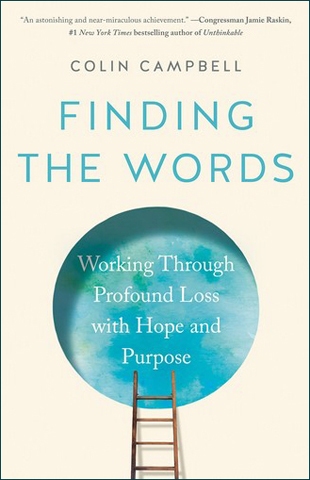There are so many books about grief and for grieving people, and this one offers something unique: It asks grieving people and those who want to help to do more than say, “There are no words.” In June 2019, Colin Campbell with his wife Gail survived the car accident in which a drunk driver took the lives of their two teenage children. Campbell admits that before going through profound loss himself, he too would often say to those who experienced terrible loss, “There are no words.”
But grieving takes place in community or not at all, Campbell explains, and the grieving person must be clear and direct with friends and family, explaining what words and gestures are helpful and which ones are not, in order to get the help and support they so badly need. Words are far more helpful than silence.
“Leaning into grief” is important, Campbell also discovered. Experiencing tragic loss, he at first wanted to retreat and avoid the pain. Then he realized, “I want to weep for them [his dead children], for their loss, for their lives, which were stolen away. It seems to me that if I ever want to feel joy or happiness again, I have to embrace the pain. I don’t get one without the other. So I lean into my grief.”
Most eloquently, Campbell shows the reader how to “take action in grief” through journaling, action, and rituals, offering multiple suggestions in each chapter. In the chapter on holidays, new holiday rituals are suggested such as a reinvented Thanksgiving, a canceled Christmas, and a significantly altered Passover Seder ritual, in detail from the Campbells’ experience.
In the chapter on denial, we find this advice: “Purposefully choose actions that maintain continuity with your past” and “One at a time, reconnect with the people in your life, taking the time to incorporate the reality of your loss into your new relationship.”
Always, the journaling prompts seem insightful and original. For example, from the chapter on ritual: “If your loved one were in charge of creating a memorial or a mourning ritual for themselves, what do you imagine they would come up with?” And, “If the funeral has already passed and you weren’t able to speak at it, write a eulogy now for your loved one. Share it with people you love.”
Campbell describes his Jewishness and writes about counseling sessions with his rabbi in Los Angeles, Sharon Brous. She has a national reputation from blessing President Obama and Vice-President Biden at the Inaugural Prayer Service in 2013 and leading the White House Passover Seder in 2021 hosted by Second Gentleman Douglas Emhoff. In the excerpt accompanying this review, you can read a poignant story from the Talmud offered by Rabbi Brous at the funeral service for Colin and Gail Campbell’s children, Ruby and Hart.
